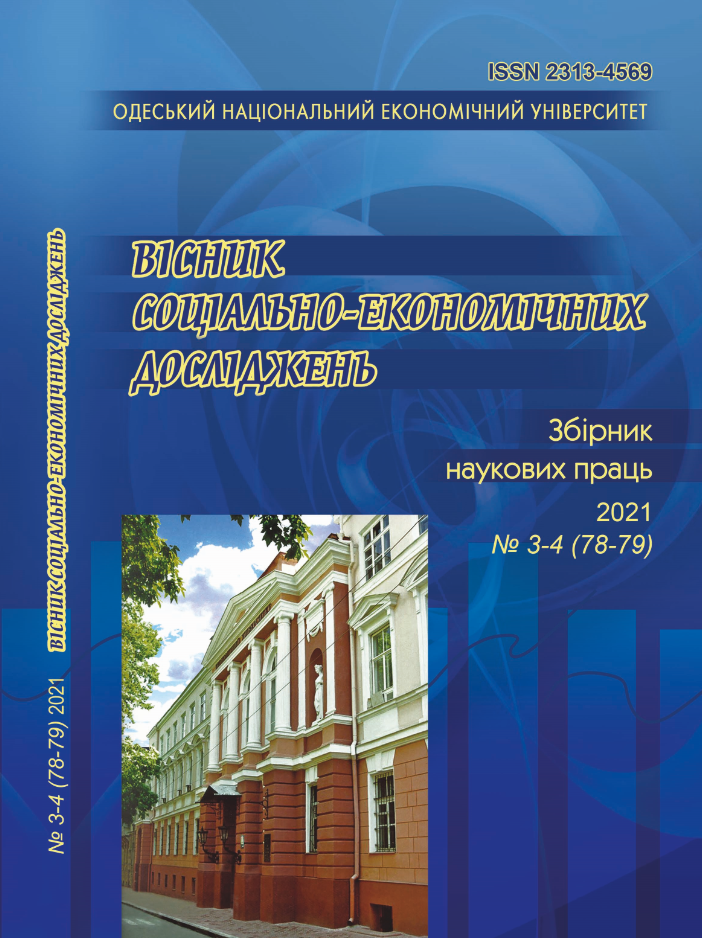ФУНДАМЕНТАЛЬНІ КОНЦЕПЦІЇ ЕКОНОМІЧНОГО ЗРОСТАННЯ В ІНСТИТУЦІЙНІЙ ТЕОРІЇ
DOI:
https://doi.org/10.33987/vsed.3-4(78-79).2021.9-18Ключові слова:
економічне зростання, суспільні інститути, інституційні норми, інституціоналізм, фактори економічного росту, нагромадження капіталуАнотація
У статті розглянуто теоретичні та практичні аспекти фундаментальних концепцій економічного зростання в інституційній теорії. Метою статті є дослідження основоположних концепцій економічного росту, сформованих представниками інституційного напряму економічної теорії, в контексті можливості їх застосування у формуванні політики економічного зростання країни в сучасних умовах господарювання. Дослідження здійснено з використанням історико-генетичного методу, сходження від абстрактного до конкретного, а також методів дедукції та індукції, узагальнення. Здійснено аналіз ґенези інституціональних теорій економічного зростання, які були спрямованими на пояснення суспільно-економічних явищ, що не могли бути осягнуті методами класичної, кейнсіанської та неокласичної теорії. Виявлено загальні ідеологічні засади інституціоналізму, які полягають у тому, що економічне зростання визначається із набором правил, що формують умови суспільного виробництва. З’ясовано, що інституційна теорія економічного зростання передбачає аналіз економічних явищ крізь призму неекономічних чинників – правил, норм, процедур, що регламентують процеси економічних змін та впливають на поведінку господарюючих суб’єктів. Визначено, що сучасні концепції інституціоналізму в абстрактному розумінні сходяться до потреби формування ефективних політично-правових інститутів, зокрема, встановлення та захищеності прав власності, державної політики протекціонізму та індустріалізації, громадського впливу та ін., які в синтезі із капіталістичною базою, ринковим та державним регулюванням наразі становлять основу економічного росту країн. Практичну цінність має обґрунтування доцільності застосування інституційних концепцій економічного зростання у процесі формування державної економічної політики, зважаючи на те, що вони визначають загальні принципи економічних систем з урахуванням множинних соціально-економічних та ідеологічних чинників.
Посилання
Veblen, T. (1899). The theory of the leisure class: An economic study of institutions. MacMillan, New York. Retrieved from: https://oll.libertyfund.org/title/veblen-the-theory-of-the-leisure-class-an-economic-study-of-institutions.
Galbraith, J. K. (1967). The new industrial state. Houghton Mifflin Co., Boston, 427 p.
North, D. C. (2005). Understanding the process of economic change. Princeton University Press, 187 p.
North, D. C. (1990). Institutions, institutional change and economic performance. Cambridge University Press, Cambridge, 82 p. DOI: https://doi.org/10.1017/CBO9780511808678.
North, D. C., Thomas, R. P. (1973). The rise of the Western World: A new economic history. Cambridge University Press, New York, 171 p.
Nort, D. C., Raskov, D. E. (2007). Institutional theory: Douglas North [Institutsionalnaya teoriya: Duglas Nort], Vestnik Sankt-Peterburgskogo universiteta, Seriya 5, Vyp. 4, s. 3–9 [in Russian]
De Soto, H. (2004). The mystery of capital: Why capitalism triumphs in the West and fails everywhere else. Trans. from Eng. B. Pinsker [Zagadka kapitala. Pochemu kapitalizm torzhestvuet na Zapade i terpit porazhenie vo vsem ostalnom mire; per. s angl. B. Pinsker], ZAO «Olimp-Biznes», Moskva, 272 s. [in Russian]
Borisov, Ye. F. (2000). Chrestomathy on economic theory [Khrestomatiya po ekonomicheskoy teorii], Yurist, Moskva, 536 s. [in Russian]
Vydobora, V. V. (2020). Scientific principles of industrial policy: foreign experience [Naukovi zasady promyslovoi polityky: zarubizhnyi dosvid], Visnyk KNUTD, Seriia: Ekonomichni nauky, No. 4 (149), s. 17–26 [in Ukrainian]
Zvieriakov, M. I., Zhdanova, L. L., Sharah, O. S. (2019). Fixed capital in the paradigm of new industrialization: reproductive aspect: monograph [Osnovnyi kapital u paradyhmi novoi industrializatsii: vidtvoriuvalnyi aspekt: monohrafiia], Astroprynt, Odessa, 202 s. [in Ukrainian]
Lemeshchenko, P. S. (2002). The transition period in the context of institutional-evolutionary theory [Perekhodnyy period v kontekste institutsionalno-evolyutsionnoy teorii], Filosofiya khozyaystva, Vyp. 3, s. 3–15 [in Russian]
Seckler, D. W. (1975). Thorstein Veblen and the Institutionalists: A study in the social philosophy of economics. University Press of Colorado, 160 p.
Tolstov, S. M. (2011). Stages of institutionalism formation and development [Etapy stanovleniya i razvitiya institutsionalizma], Izvestiya Samarskoy selskokhozyaystvennoy akademii, No. 2, s. 11–13 [in Russian]
##submission.downloads##
Опубліковано
Номер
Розділ
Ліцензія
Авторське право (c) 2021 Вісник соціально-економічних досліджень

Ця робота ліцензується відповідно до Creative Commons Attribution 4.0 International License.






